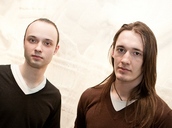

|
Artworks: Click here | |
| RECYCLE (Andrey Blokhin, Georgiy Kuznetsov) |
Andrey Blokhin
Born in 1987 ãîäó in Krasnodar, Russia.Georgiy Kuznetsov
Born in 1985 in Stavropol.Andrey Blokhin
Some personal shows
2010 Reverse, M&J Guelman, MoscowSome group shows
2008 RUSSIAN POVERA. A SERGEY GORDEEV PROJECT, RIVER STATION HALL, Perm, RussiaGeorgiy Kuznetsov
Some personal shows
2010 Reverse, M&J Guelman, MoscowSome group shows
2008 RUSSIAN POVERA. A SERGEY GORDEEV PROJECT, RIVER STATION HALL, Perm, RussiaThe Recycle group is among those contemporary artists who do not announce their position too noisily, and, instead, prefer not so much to uncover problems or provoke confrontation as to look for compromises and the means of making peace between incompatible and competing aspects of the modern world – a world, of course, made up first and foremost of concepts and images, which are the traditional territory of artists. Recycle`s approach, however, is less akin to the work done by negotiators, lawyers, or psychologists and resembles more that of computer specialists. Like them, members of Recycle concertedly dig through various cultural and visual "software," which has managed to grow into a thick layer on the hardware of collective consciousness, and try to identify conflicting "programs" in order to force them not to interfere with each other.
The most obvious conflict identified in the artists` new project, Reverse, has already been thoroughly explored by contemporary art: it is the clash of the images and stories of classical art with the reality of contemporary life. It is commonly thought that traditional art, which is familiar through illustrations if not through museum exposure, is more accessible to the common man than the experiments of contemporary art. History, however, has by now also absorbed the polemical statements of avant-garde artists. "The Academy and Pushkin are more inscrutable than hieroglyphics", wrote the Russian Futurists in 1912 when they authored the manifesto "A Slap in the Face of Public Taste."
In its new project, Recycle does not really try to translate the "hieroglyphics" of classical art, but, rather, to find new uses for them – i.e. recycle them, having looked at them from another side, from that very reverse side which points the classics in the direction of the present rather than the past. Thus, they see in a sarcophagus a trash can, which immortalizes the paper battles of an office warrior; in The Last Supper, a tense business meeting; and propose that the feats of modern-day "defenders of the faith" – comic book superheroes – are an ideal subject for stained glass windows. Though it would seem that Recycle takes as its point of departure not so much contemporary subject matter as contemporary materials. Plastics are hardly suitable for the "eternal," which is meant to accumulate the passing centuries; their destiny, rather, is to be unchangeable in the same way as canned or frozen food.
The conflict of the classical with the contemporary, however, is only the first of the ones Recycle tries to reconcile, and not even the most difficult one at that – if anything has been developed well in contemporary art, it`s the technologies for solving those kinds of problems. What is much harder to do is reconcile the Western European artistic tradition with Russia`s domestic realities. Recycle is obviously made up of "Western" artists, oriented towards European and American contemporary art. And so Reverse, too, relies exclusively on the European classical tradition (even the sarcophagus here is an ancient Greco-Roman rather than Egyptian one) and European contemporaneity; the new project reminds one, for example, of Wim Delvoye, with his Gothic escalators, Baroque cement mixers, and football goalposts enclosed in stained glass. The Belgian artist, however, worked with his own, i.e. European, classical tradition, whereas our compatriots in Recycle are forced to work with imported material – so that their contemporaneity turns out to be quite globalized, made up of nothing but offices and consumer culture. Their work, aimed at removing conflicts between programs, succeeds too well; at the exhibition, one involuntarily feels happy that the world of contemporary man is much more peaceful, safe, and bloodless than then one captured by classical art. For contemporary collisions, the language of old dramas is useless anyway – one could hardly make a pseudo-antique sarcophagus with bas reliefs representing battle scenes from modern-day hot spots.
Irina KulikRequest
more information about artist
© 1994-2024 ARTINFO
All rights reserved
designed by ARTINFO
hosted by ARTINFO